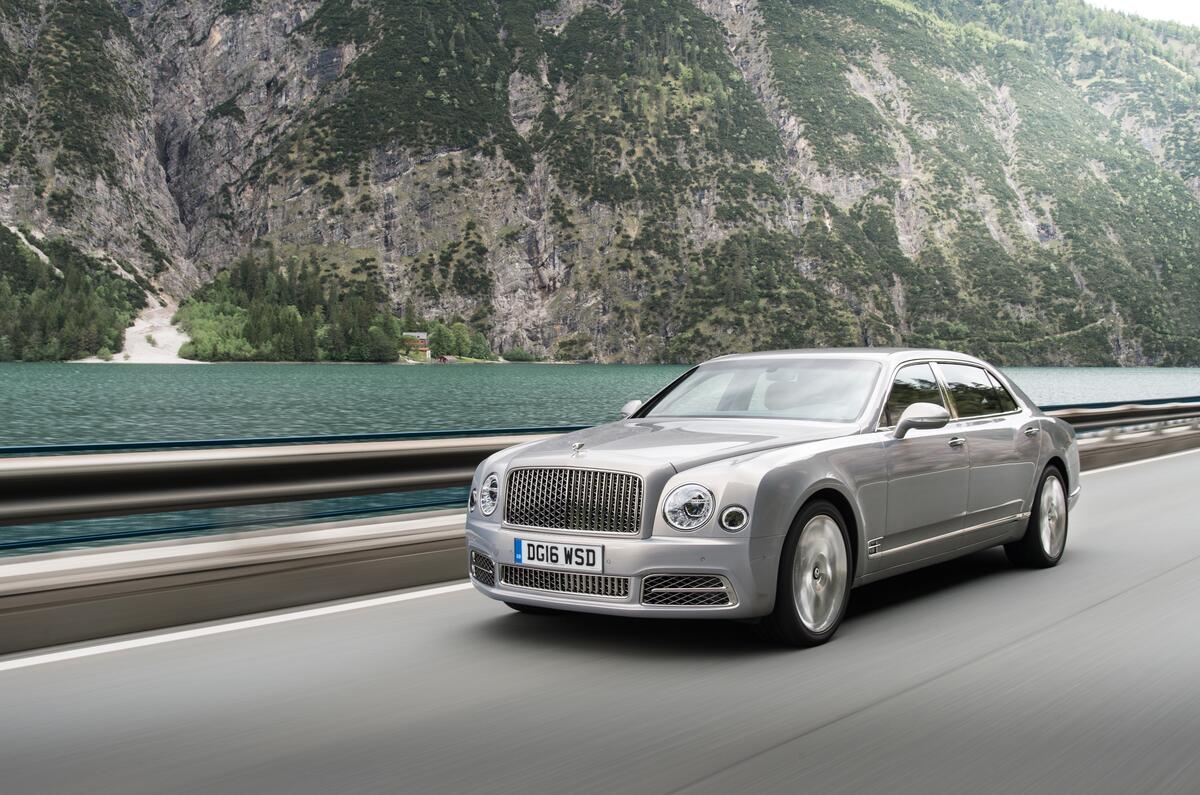The current-generation Bentley Mulsanne could get an all-electric powertrain to meet the increasingly stringent demands of global emissions regulations.
Speaking exclusively to Autocar at a customer demonstration of the new Mulsanne Extended Wheelbase, Mulsanne product and marketing manager Hans Holzgartner said an all-electric powertrain was already under consideration. He cited draft paperwork from Chinese law makers as a motivating factor to push it into production.
Read more: Top 10 best electric hatchbacks
“At the moment, the indication is that full electric will be the only way that you’ll get into some of the cities in China,” he said. “I wouldn’t say we’re discounting [hybrid engines] completely, but it looks like if you don’t have a full electric drive, even some of the hybrid drives just won’t get into some cities in China.”
Holzgartner made reference to movements for similar legislation in some parts of Europe, Germany being the latest to voice its intentions to encourage a zero-emissions future. To cater for these key markets, the car’s current use of a petrol V8 engine was unsustainable, he added.
Asked if an all-electric powertrain would suit the characteristics of the Mulsanne, Holzgartner said: “Yes, absolutely. I think electric is much better suited to bigger, heavier, smoother saloon cars than sports cars.”
He said sports cars can be hampered by heavy battery packs and lose character when swapping high-revving engines for electric motors, but cars focused on offering a comfortable, luxurious ride like the Mulsanne can actually be improved by such a powertrain.
“With a Mulsanne-sized car, it’s all about torque anyway,” he added. “The delivery characteristics of electric drive — loads of bottom-end torque, almost silent delivery, very smooth — they all fit.
“Our challenge is to make something that’s as interesting to drive as a current Bentley, because while a Mulsanne will be driven in almost silent mode even with a petrol engine, if you’ve got a Mulsanne Speed you’ll want to let rip every so often. That’s going to be the challenge: creating something that can be fun as well.”
Holzgartner mentioned the deep, bellowing engine note of modern Mulsannes, saying he personally preferred the V8’s sound to alternative engines, such as the W12. An electric motor would have to somehow offer something to cater for this loss of “character”.





Join the debate
Add your comment
Simulated engine
Someone clearly hasn't done their calculations...
Good old VW marketing - true to type - based entirely on total b*ll*cks.
total b**** ???
I'd be interested in your scientific calculations and the method used to come to such an offensive conclusion. 3 day charge giving less than 12 miles????
Calculations
I can be a bit more specific than that. The highest production battery pack density right now is 0.165 kWh/kg. The most directly comparable car to an electric Mulsanne, the Rolls-Royce 102EX, had a 640 kg battery pack, so a new one in that format would have 106 kWh energy (of which 90% cells usable = 95 kWh). The 102EX managed a truck-like 1.75 miles per kWh. That equals a real-world range of 166 miles.
CCS chargers currently max out at 80kW, which would charge that battery from 0-80% in 57 minutes. 150kW chargers will start rolling out in two years' time, which will do it in 31 minutes. By this time next decade we'll have 300kW chargers, which would do it in 15 minutes.
pauld101 wrote: If he'd
Paul is entirely correct. Electric cars are a waste of time, money and resources. We need to get away from these stupid, ineffective and wasteful monstrosities. They are nothing more than a plan dreamed up dream by the lefties to curtail the mobility of the people and exert control over the populations of nations. They will ultimately fail because they simply aren't ever going to be good enough to replace the internal combustion engine. Something else may, eventually, but it won't be electricity. Electric cars are going nowhere.
*should read "plan dreamed up
It always has made perfect
As I've said on here before, realistically, how many of these cars are driven transcontinentally or exceptionally long journeys on regular basis? I would suggest most owners would jump on a flight if there were any real distance involved.
The are used, predominantly used for Urban chauffeuring and runs which an EV power pack could deal with easily.